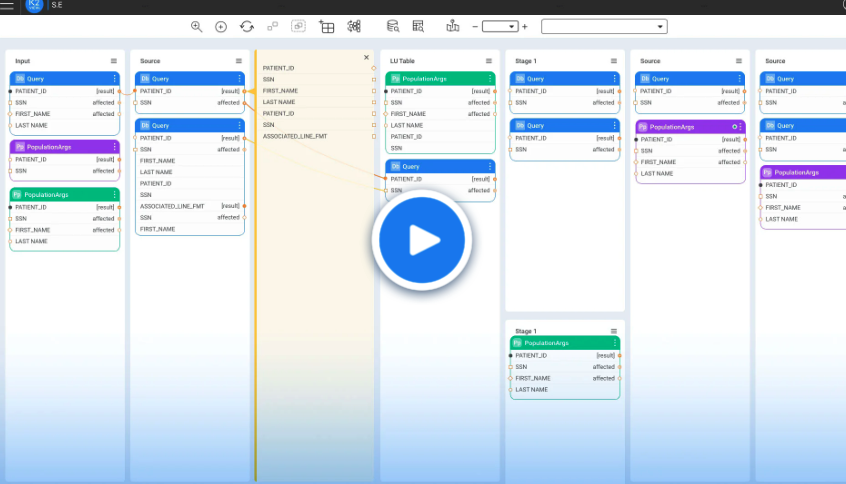Data tokenization software replaces sensitive data with a non-sensitive equivalent, or token, and may enable storage of the original data in a token vault.
Table of Contents
Understanding the Need for Data Tokenization Software
What is Data Tokenization Software?
Choosing the Right Data Tokenization Software
Data Tokenization Software Needs Protection
Data Tokenization Software Based on Business Entities
Understanding the Need for Data Tokenization Software
It’s easy to understand the benefits of tokenization. Choosing the right data tokenization software for your organization is less obvious.
For years, data tokenization (aka data anonymization) has played a critical role in protecting payment information to ensure compliance with the Payment Card Industry Data Security Standard (PCI DSS). As a result, most tokenization software is designed to comply with standards for protecting Personal Account Number (PAN) data.
However, organizations across every industry are now recognizing the need to protect all types of sensitive data. As a result, today’s data tokenization tools vary significantly in deployment models, tokenization and de-tokenization methods, technologies, and processes.
As more data tokenization software enters the market, it’s become more important to know how to evaluate your options in order to make the right choice for your organization.
What is Data Tokenization Software?
Like data masking software, data tokenization software replaces sensitive data with a non-sensitive equivalent (or token), and may store the original data in a specialized token vault. Tokenization of data allows businesses to safely store and use sensitive data while complying with various data privacy and protection laws.
Unlike data masking tools, the process of tokenization replaces sensitive data across databases, data repositories, internal systems, and applications with non-sensitive data elements, such as a randomized string of characters.
As opposed to anonymized data, tokenized data is stored in a centralized token vault together with the original sensitive or personal information. However, some vault-less approaches are also worthy of study.
Data tokenization software enables enterprises to:
-
Comply with data protection requirements
-
Reduce the cost of compliance
-
Boost threat protection
-
Mitigate risk
Choosing the Right Data Tokenization Software
Once you’ve determined that tokenization is the right data obfuscation method for your business, the following 6 questions will help steer you toward the right data tokenization software.
-
What are your business needs?
Unless you have defined and quantified your business needs, it’s impossible to determine which functionalities you require, or how to measure ROI. The most common needs related to data tokenization software include strengthening your cybersecurity posture and improving compliance with data privacy laws. While most vendors’ solutions are built to comply with PCI DSS, there’s greater variance in solutions that focus on other types of PII, such as medical data or social security numbers. -
Where is your sensitive data located?
Once you understand your business needs, the next question to answer is which systems, platforms, apps, and databases store sensitive data. You’ll want to look for data tokenization tools that tokenizes sensitive data everywhere it’s in use. It’s also important to map out how this data flows, because data is also vulnerable while in transit. -
What are your system/token requirements?
Next, you need to know the specific requirements for integrating data tokenization tools into your database and apps. To identify the software that's right for you, consider:– Which databases do you use?
– What language are your apps written in?
– Where are your apps and data centers distributed?
– How do you authenticate your users?
With this information, you can determine whether you need single-use or multi-use tokens. -
How will tokenizing data impact business continuity?
If there is a strong need among data consumers in your organization to work with sensitive data, it’s crucial to find data tokenization software that's “format preserving.” A format-preserving token adheres to the same structure as the original data, which allows data consumers to use it to perform analytical and operational workloads. -
Should you go vaultless?
Vault-less data tokenization software offers many benefits. First of all, it's generally faster. Second, software that distributes the storage of sensitive data, also reduces the risk of a massive breach. Third, it makes it easier to scale data loads, compared to centralized vaults (which often become bottlenecks in massive scaling). -
Should you build a solution in house, or outsource it?
After you’ve answered questions 1 through 5, it’s time to ask how to best obtain the capabilities you need. Generally, it’s easier, faster, and more effective to go with a trusted vendor. Although enterprises with robust data engineering teams might have the skills to develop their own data tokenization software in house, most lack the bandwidth. By working with a trusted partner, you the tokenization capabilities you need, as well as helpful customer support, without overburdening your data teams.
Data Tokenization Software Needs Protection
To ensure your data tokenization software fulfills its promise for enhanced cybersecurity, compliance, and business utility, it must be protected with strong security controls and monitoring.
The right data tokenization software should include:
-
Token server protection
The tokenization server is responsible for reversing the tokenization process. If the server is not adequately protected, it could render the entire system useless. An unsecure token server also undermines compliance efforts. Therefore, you’ll want to make sure that your token server is encrypted and secure.
-
Data vault encryption
Whether your tokenization software relies on a distributed or centralized token vault, the vault must be encrypted in accordance with regulatory standards and your organization’s security policies.
-
Strong access controls
Access to original sensitive data and detokenization keys should be highly secured with strong access controls. Common examples of access controls include logical or physical segregation of data storage, and role-based permissions.
-
Auditing capabilities
It’s imperative to keep a log of all changes to your data tokenization activity, as well as instances of de-tokenization, including:-
User identification
-
Access in terms of data and time
-
Terminals for source and target
-
Actions performed
-
Events triggered
-
Data Tokenization Software Based on Business Entities
A business entity is a complete set of data on a specific customer, vendor, credit card, device, or payment. Entity-based data tokenization software provides better security, simplifies compliance, and empowers data consumers to work with tokenized data safely and without disruption.
Unlike conventional data tokenization software, which contains a centralized data vault to store original sensitive data, entity-based data tokenization software makes use of individually tokenized Micro-Databases™ (one for every business entity). Imagine each customer having their own micro data lake.
Micro-Databases significantly reduce the likelihood and scope of a breach by preventing all sensitive data from being stored in one location. They're also highly configurable, making compliance easier to manage. Since they’re also format-preserving and maintain data consistency based on hashed values, data tokenized via business entities can be used for operational and analytical systems.
Entity-based data tokenization software helps you keep your data consumers happy, and your business running smoothly.
Learn more about Micro-Database-powered data tokenization tools













